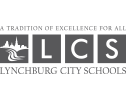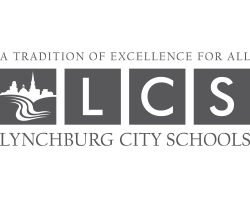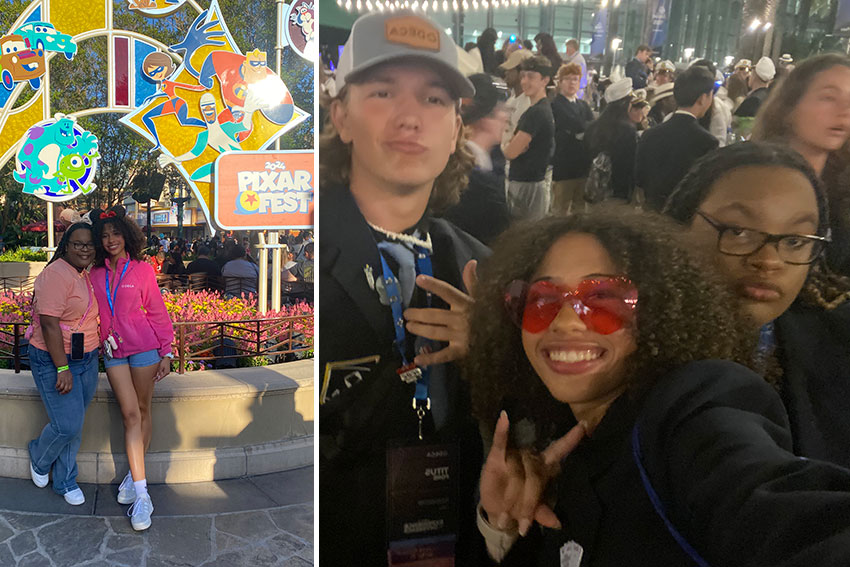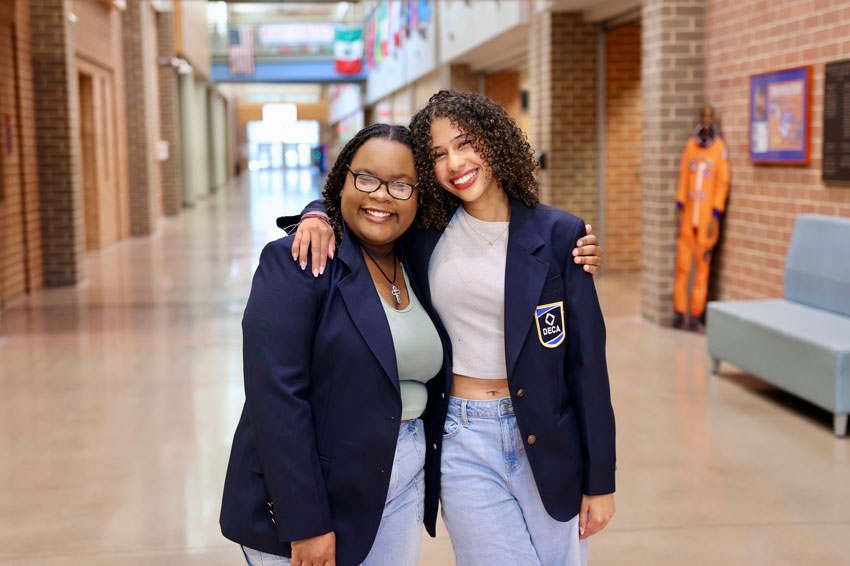
Heritage High School twelfth grader Essence Rosser (left) and eleventh grader Serena Hernandez (right).
When Heritage High School students Essence Rosser and Serena Hernandez got the news that they’d qualified for the International Career Development Conference (ICDC), they could hardly believe what they were hearing. Though they’d given their all making fast decisions and pitching business strategies at the state-level contest, they hadn’t expected to make it this far.
The ICDC is hosted annually by Distributive Education Clubs of America (DECA), which provides opportunities for high school students to test their Career and Technical Education (CTE) competencies in the areas of marketing, finance, hospitality, management, and entrepreneurship. The 2024 state conference was the final step before the ICDC in Anaheim, California from April 27-30.
“It felt unreal. I thought, there’s no way we’re going to internationals. The fact that we’re the first students from LCS to go to the international competition in more than a decade is crazy,” Hernandez said. “You should have seen the looks on our faces when they called our names.”
Rosser and Hernandez placed seventh out of 74 teams in the state contest, which required them to take a comprehensive knowledge test as well as analyze a case study relevant to the travel and tourism industry and propose a solution together.
“After we got off the stage, we asked (our teacher), ‘Is this real? Are we actually going to internationals?’ I was shell-shocked,” Rosser said.
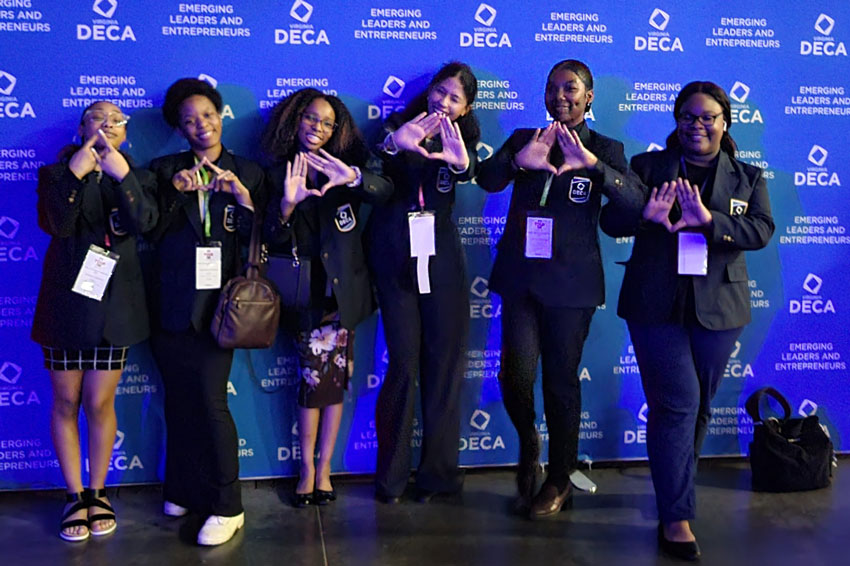
Rosser and Hernandez competed alongside four fellow Heritage High students at the state conference.
Competing in the International Arena
This year, the ICDC brought in more than 23,000 high school students, teacher-advisors, business professionals, and alumni. In Anaheim, Rosser and Hernandez competed against the most advanced DECA students in the world, networked with industry leaders and other students, and met representatives from colleges across the country. Though they didn’t place at the international competition, they still walked away with priceless connections and experiences.
“Even though they didn’t win awards, they won experiences, and you can’t beat that,” said Heritage High marketing teacher Andrew Kelso, who accompanied them to Anaheim.
At the ICDC, Kelso was honored for his 40 years of service as a DECA advisor. He considers DECA competitions incredibly valuable, both to students and to advisors. The professional connections and career development opportunities DECA affords are unmatched.
“I don’t even realize it’s been that many years. The opportunities these competitions bring for students and for me make it easy to stick with DECA,” Kelso said. “A lot of kids won’t take opportunities to compete because they’re afraid to lose, but you can’t win if you don’t try.”
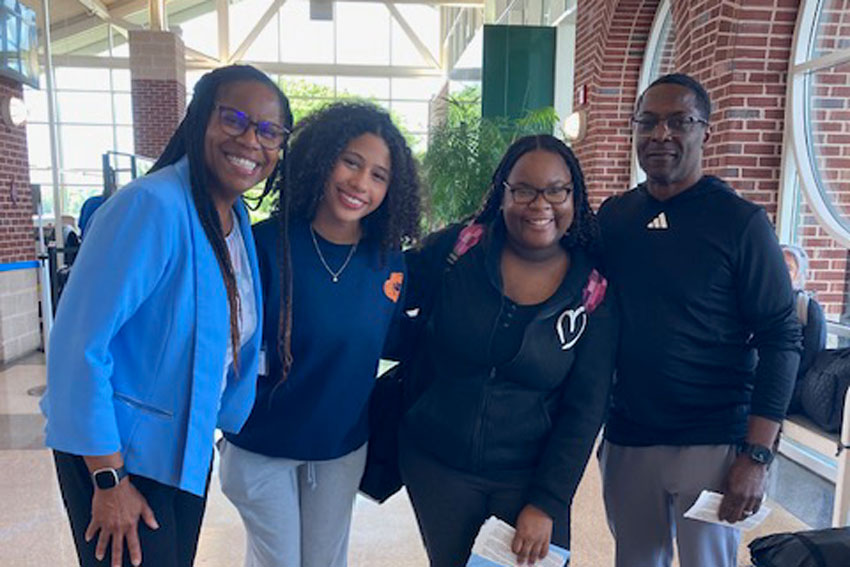
LCS Superintendent Crystal Edwards (left) and Heritage High marketing teacher Andrew Kelso (right) sent Rosser and Hernandez off to the ICDC.
An English Learning Journey
As well as Rosser and Hernandez performed in this year’s DECA conferences, there was a time neither of them would have imagined themselves having the skill or confidence to compete. Kelso introduced Hernandez to DECA just this school year in an entrepreneurship class.
Five years ago, the idea that Hernandez would be giving complex, improvised presentations to judges on an international level would have sounded far-fetched to her. She and her family immigrated to Florida from Venezuela when she was in the sixth grade, and she struggled to learn English at first.
“I had to work twice as hard at school because I had to translate everything first. I had to ask my friends for help communicating in English, and I didn’t know the systems or how things worked in the U.S,” Hernandez said.
Thanks to friends who helped her navigate school and learn the language, Hernandez was fluent in English by the time she reached the eighth grade. She moved to Lynchburg in the middle of her tenth grade year with a sense of confidence in her language skills.
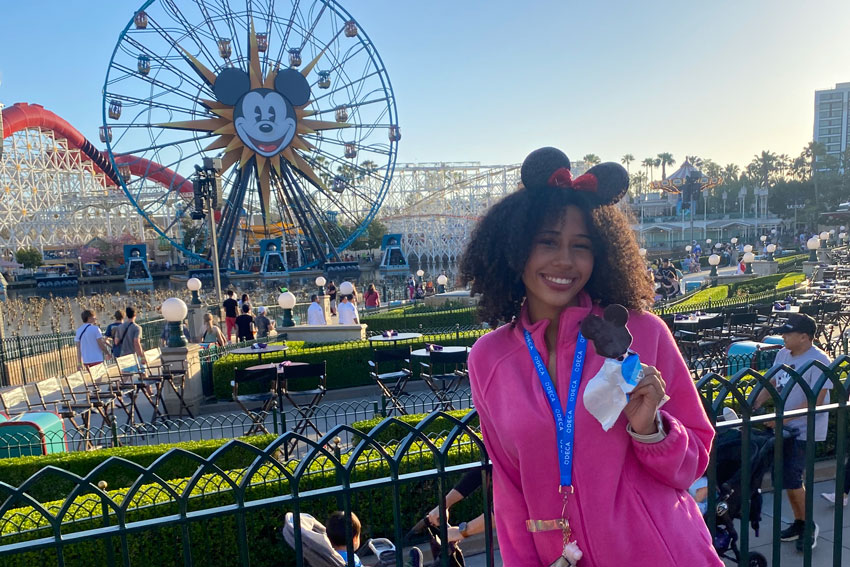
Hernandez went from learning English to giving complex presentations at DECA competitions in just four years.
“Looking back, I would tell my younger self that it’s actually possible to excel in English. When I was a kid, I didn’t think I would be able to hold a conversation beyond just asking for the bathroom. But now, I’m presenting in English, improvising entire business plans, and using a broad vocabulary,” Hernandez said.
Now, Hernandez sees her bilingualism as an asset. She’s used it in professional settings on many occasions, from interacting with Spanish-speaking customers at part-time food service jobs to helping her dad with his auto repair business, which serves Spanish-speaking clients.
“Being Hispanic has always opened doors for me. The ability to speak two languages is valuable,” Hernandez said.
Last year, Hernandez served as a student assistant for the English Learners (EL) program at Heritage High, helping students navigate school in the U.S. and facilitating communication between teachers and EL students. This year, she used her Spanish to recount her experiences with DECA to EL students when she and her classmates visited Sandusky Middle School for CTE Day.
“I had friends who helped me when I was a kid, and these kids need people to help them out, too. I’m passionate about helping EL students because I understand what they’re going through,” Hernandez said.
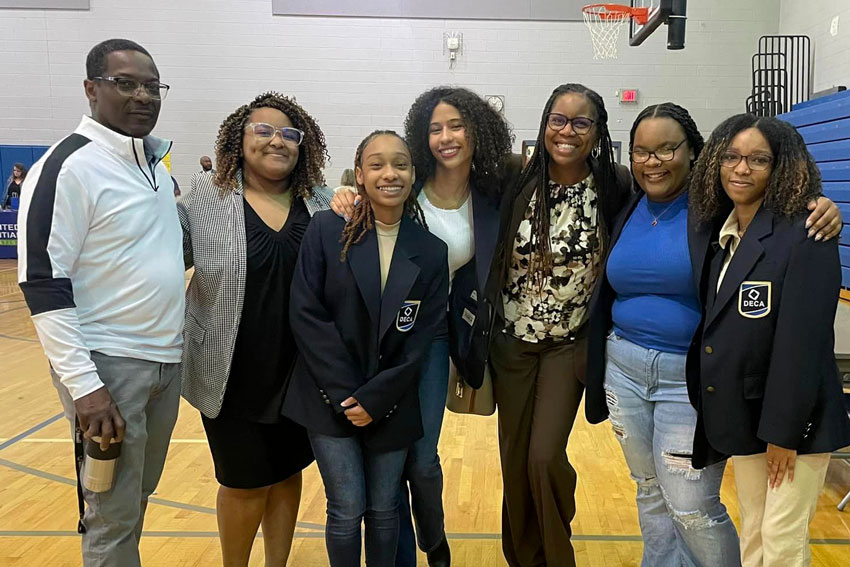
Rosser and Hernandez shared their experiences with DECA at Sandusky Middle School’s career fair in April.
The Power of Mentorship
Rosser’s experience with DECA has also inspired her to impart her knowledge and wisdom to younger students. She’ll attend Johnson & Wales University in the fall, where she’ll study marketing. She plans to get involved with DECA at the collegiate level, which will give her opportunities to serve as an advisor to high schoolers and help facilitate DECA events and conferences.
“I love competing. Coming up with an idea on the spot is so fun. It’s like a brain test, and once you finish, it shows you what you can do,” Rosser said. “The community is amazing. Everyone is so nice, and even students who are confident and experienced will give you advice and help you if it’s your first time competing.”
This is Rosser’s second run as a DECA state competitor. Last year, she qualified for the Virginia conference for her performance in a hospitality solo event. She’s been taking marketing and entrepreneurship classes with Kelso for the last two years and sees him as a mentor. She’s developed a passion for marketing under his guidance and will graduate from high school with valuable industry experience under her belt.
“My mom was in the hospital for a while, and Mr. Kelso helped me through that hard time. I hit a rough patch, but he encouraged me to keep going. He motivated me to get ready for the competition. He’s always sending me links to scholarships,” Rosser said.
When Rosser qualified for the ICDC, the first person she called was her mom. Her family traveled with her to Anaheim to support her and see the sights.
“I called my mom and said, ‘Mom, you will not believe it. We just qualified to go to California. I’m getting on a plane.’ And she said, ‘No, we’re getting on a plane,’” Rosser said.
Rosser had never been off the east coast before, so qualifying for the ICDC was exciting in more ways than one. She and Hernandez worked hard at the conference, but they also got to relax and enjoy some well-deserved rewards for their efforts, like exploring Disneyland and enjoying social mixers with competitors from all over the world.
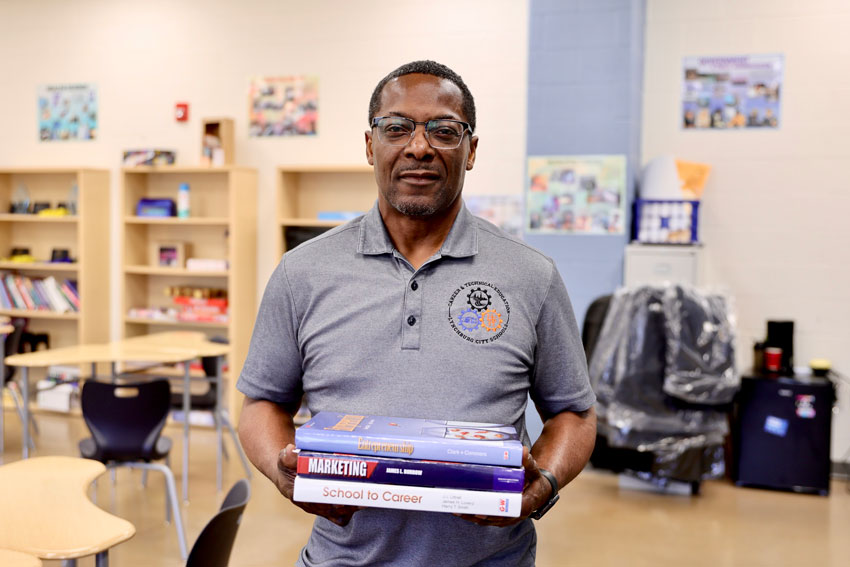
Heritage High marketing teacher Andrew Kelso has been a DECA teacher-advisor for 40 years.
Skills to Last a Lifetime
Many students like Rosser and Hernandez go on to build successful careers on the foundations of what they learned from competing with DECA. LCS also sends students to other CTE competitions, like the Family, Career and Community Leaders of America (FCCLA) and SkillsUSA conferences, each year.
But even if students don’t pursue careers directly related to these competitions, the experiences they gain and skills they develop stick with them for a lifetime. Along with industry-specific skills in fields like marketing, business, nursing, dentistry, cybersecurity, culinary arts, cosmetology, and automotive technology, LCS CTE programs teach transferable skills like communication, leadership, public speaking, teamwork, research, and more.
“It’s not always about the academic grade for me. I feel better when I have a student come back and say I had an influence on them and gave them opportunities to experience things that they wouldn’t have been able to experience otherwise,” Kelso said.
